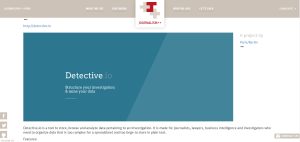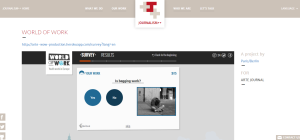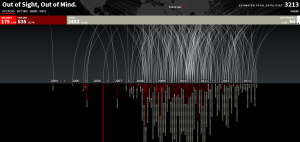Journalism++ is an agency for data-driven storytelling. Started by three people, it is now a network of independent for-profit companies working from Berlin, Paris, Stockholm, Cologne, Amsterdam and Porto. They define journalism as ‘making interesting what is important’, not ‘making important what is interesting’. Winner of Data Journalism Awards 2014, the agency is famous for building data-driven web-apps, creating visualizations, and, last but not least, investigative journalism projects. How cool is that? We discuss it with a CEO and co-founder of J++, Nicolas Kayser-Bril. A self-taught programmer and journalist, Nicolas holds a degree in Media Economics. He is also investing in data journalism as instructor at massive open online courses taught in English and French.

Nicolas, how did you decide that it’s a time to open a data journalism agency?
Before, together with Pierre (Pierre Romera, Chief Technology Officer and Developer at J++), we worked at the news start up called OWNI in Paris.
OWNI is a legendary French newsroom launched in April 2009, where Nicolas was a head of the data journalism team. It was focusing on technology, politics and culture and running on a non-profit economic model. Twice a winner of Online Journalism Awards, OWNI is probably most famous for its cooperation with Wikileaks .Due to financial problems, OWNI was closed down on 21 December 2012.
As things at OWNI get worse, we left it at 2011 and wanted to keep working together. He is a developer, I am a journalist, so we looked for different newsrooms in Paris and London, who might be willing to hire us as a team. Some newsrooms told us: ok, you can come and work for us, but the developer is going to work with developers, and the journalist is going to work journalists, which we refused. So that’s why we created the company: it was more a plan B, but we just wanted to keep doing data journalism together.
Why did you open up in Berlin and how did the name come up?
The name was a nerdy joke: when you code and you add ‘++ ‘, it means that this variable is now equal to the value of the variable plus one, so basically ‘journalism ++’ means’ journalism equals journalism +1’. So, something more than just journalism. As for the city, again, it was not planned, but just happened. At that time I was living in Berlin, and Pierre was living in London. Since both Pierre and me are French, we first created a company in Paris due to the legal reasons, and we actually planned on going back in Paris. But at some point our Head Project Manager Anne-Lise Bouyer decided to move to Berlin, and we created this way of working between two cities. Now it’s seven people here.
But aside from seven people in the core team, you do have the branches. How did you develop this and what’s the rule to be accepted in the club?
This franchise program developed again kind of randomly. We knew Jens Finnas and Peter Grensund from Sweden, they were very good and we heard that they were going to open an agency. So we just told them, that it would be cool to have the same name, and to create this franchise concept. Since it worked really well with J++ Stockholm, we expanded to the other cities. The idea is to bring together the best data-driven journalists in every market, so we are looking for really good developers mostly, because we believe, that DDJ is really a technology thing. And then you need to come up with the concept, to show that you are not just doing things, but that you have a plan to create a company. We do not want to make our brand kind of a label that we give or don’t give to people. This is more about creating the companies, because this makes you much stronger in your journalism investigations.
What’s you favourite own project so far?
Right now we are pivoting towards Detective.io.
Detective.io is an open-source tool developed by the Journalism++. It lets users to upload, store and mine the data you have on a precise topic. Therefore, it is a useful platform to host an investigation, be this done by journalists, lawyers or business intelligence. To start working, you need to download the source code and install Detective.io on your own server. Alternatively, you can do everything online on detective.io which is much simpler and exactly as safe.
We run some of our investigative projects to advertise this tool, such as The Migrant Files or the Belarus Networks (a database of connections within the Belarussian elite, to be published soon). Pushing Detective.io to the new markets, we invest in the investigative journalism as a field. We are also going to provide the customization services to this.
Before that there was something really cool that we did for the Arte at the beginning of this year. The special thing about this was that Arte came to us and said: we want to do something about the employment and the work situation of young people in Europe, so we did the project from the concept to the development. This was called World of Work.
Which is just another evidence of how many shapes can journalism take nowadays, since this project was a questionnaire?
Exactly, in this case we wanted the young people who would take the questionnaire to ask themselves the questions about the work that they might not have asked themselves otherwise. It was 60 questions on various topics, and we pretended that it was a survey, but actually the idea was to make users think in new ways about their work situation. For instance, something that we did was to never talk about unemployment or employment, because we believe these categories never work for the younger generation. The reason I am very happy about this is that people who took the questionnaire told us that some of the questions they would never have asked themselves. And this really made them think, and this precisely was the goal, even if we they did not realize that it was the goal that we had.
Did you get a psychologist in the team for this project?
We hired a consulting from the advertising to create the atmosphere. Generally, it was a huge amount of research, and a multi-skilled team including developer and designer. But the ‘other’ skill we had to put to the project was from advertising because it’s surprisingly hard to write for 22-30 years group and to find the questions that were interesting for the user and relevant for the project.
What are currently your favourite tools?
Apart from Detective.io, when it comes to simple visualizations I use Datawrapper (another project of J++, which is run by J++ Cologne) or Chartbuilder (project by Quartz). You have so many tools, and also it really depends from project to project, for example right now we do social network visualization, so we use Gephi a lot – open source social network analysis software.
What would advice to people who want to promote DDJ in Russia?
You have lots of the agencies doing cool stuff there, and I think it’s important to have good developers who understand something about journalism, and that’s how you can have the good ideas, because otherwise you would just mimic what’s happening in the other countries, but that’s not the point. The point is to leverage technology, to bring something new to the field. And in this case either you learn how to code or you find a developer.
That said, data driven journalism sometimes looks like an inner thing, a nerdy direction of journalism. Do you think it can become a mainstream?
What you say is especially true, with what was created in the US this year, like Upshot,Vox and 538, and I agree, it might shift the definition of DDJ to the nerdy field. But if you consider the data journalism as a journalism which could not be done without a computer – which is the definitions I favour – then you can do anything. Like in the project ‘World of work’ I was referring to: what’s special about this, is that it has been done by journalists working with developers. But as a user, you don’t realize it. And that’s what we should aim at.
Is then data journalism something that we have been known before, under different names, like computer-assisted reporting, or there’s something particularly new about the data journalism as we know it today?
It’s true that using computers for journalism is nothing new, same thing with visualization of data, but what’s new, especially in Europe is that people in the newsrooms have realized that they need some math to do their work. Before if you wanted to do a piece of computer assisted reporting, you needed to have a statistician, you had to go out and rent computer, and computer time was extremely expensive. Now you can do same kind of analysis in a few hours for 0 euros. And then anyone can do it and publish. And there is also another aspect: the term ‘online journalism’ has been hijacked by the people doing copy paste journalism. So that’s also one of the main reasons why data journalism is fashionable now: it means doing journalism online in a different way than it was done for the past 10 years.
The profession of journalism as a whole is very much shifting nowadays, where so many things of journalism are being done by citizen journalists or bloggers, and in the same time the ‘real’ journalists have to acquire the skills they were never asked before. As a self-taught journalist, what is your stake on this?
That’s a very interesting topic and we might talk about it a few hours. The definition of journalism or who the journalist was before the digitalization of content was really a definition by the means. The journalist was the person who had access to the means of publication or broadcast. And that’s why the anchor on Russian TV is a journalist even if she’s just repeating what the government wants her to say. And the investigative journalist at the New York Times is also a journalist, because they both have access to the means of communication to the public. And this concept doesn’t exist anymore.
Now everybody can publish. And what you see, when it was Ben Laden assassination, you had this guy in Pakistan, he had no contact to any media outlet whatsoever, he just published a couple of tweets and then he was for a few minutes the leading news source on the topic.
Take another example, at Aurora shooting in Colorado, when there was this guy dressed as Superman who came to the movie theatre in Denver, Colorado, and shooted everyone, and for the first 10-12 hours the main source of information was this teenager in his room close to the shooting. It was at night, so it took like 10 hours for the TV stations to come on location, and during this time he was the one checking the information and just doing journalism. And when he was asked why he did it, he just said: I thought it was needed.
Next, there was a visualization with all the drones strike, it was just a nice visualization, there was no breaking news, it was more like a cold journalism thing. But it became extremely successful, and again, the reason behind it, as the author said – this story has not been told, I though it needs to be told.
What all these things have in common, is adding value to the information in the public interest. And I think, this is what constitutes journalism today. If you are working full time in the news room writing articles or presenting the news at the TV, I would call it not journalism but information professional.
That’s why I define journalism not by the occupation of the people who do it, but really by the goal, telling info in the public interest. And anybody can do the act of journalism.
Team photo: © Marion Kotlarski/Journalism++




